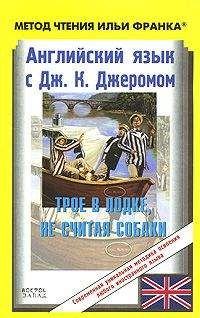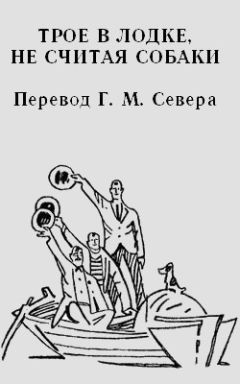Jerome Jerome - Английский язык с Джеромом К. Джеромом. Трое в лодке, не считая собаки
chief [ʧi:f] disinclination [,dɪsɪnklɪˈneɪʃ(ǝ)n] martyr [ˈmɑ:tǝ] science [ˈsaɪǝns]
In the present instance, going back to the liver-pill circular, I had the symptoms, beyond all mistake, the chief among them being "a general disinclination to work of any kind."
What I suffer in that way no tongue can tell. From my earliest infancy I have been a martyr to it. As a boy, the disease hardly ever left me for a day. They did not know, then, that it was my liver. Medical science was in a far less advanced state than now, and they used to put it down to laziness.
"Why, you skulking little devil, you," they would say, "get up and do something for your living, can't you?" — not knowing, of course, that I was ill.
And they didn't give me pills (мне не давали пилюль); they gave me clumps on the side of the head (мне давали подзатыльник /по голове/; clump — заросли; ком, глыба; удар). And, strange as it may appear (и, как ни странно это может показаться), those clumps on the head often cured me — for the time being (те подзатыльники часто излечивали меня — на некоторое время; to cure — излечивать, исцелять). I have known one clump on the head have more effect upon my liver (я знаю, /что/ один подзатыльник оказывает большее действие на мою печень), and make me feel more anxious to go straight away then and there (и заставляет меня чувствовать больше желания пойти тотчас, сразу же; anxious — тревожный, беспокойный; сильно желающий), and do what was wanted to be done (и сделать /то/, что требовалось сделать), without further loss of time (без дополнительной потери времени = не теряя времени), than a whole box of pills does now (чем целая коробка пилюль оказывает теперь).
You know, it often is so (видите ли, так часто бывает) — those simple, old-fashioned remedies are sometimes more efficacious than all the dispensary stuff (/те/ простые, старомодные средства иногда более действенны, чем весь аптекарский персонал; dispensary — бесплатная аптека для бедняков; диспансер; амбулатория).
anxious [ˈæŋkʃǝs] effect [ɪˈfekt] remedy [ˈremɪdɪ] efficacious [,efɪˈkeɪʃǝs]
And they didn't give me pills; they gave me clumps on the side of the head. And, strange as it may appear, those clumps on the head often cured me — for the time being. I have known one clump on the head have more effect upon my liver, and make me feel more anxious to go straight away then and there, and do what was wanted to be done, without further loss of time, than a whole box of pills does now.
You know, it often is so — those simple, old-fashioned remedies are sometimes more efficacious than all the dispensary stuff.
We sat there for half-an-hour, describing to each other our maladies (мы просидели полчаса, описывая друг другу свои болезни). I explained to George and William Harris how I felt when I got up in the morning (я объяснил Джорджу и Уильяму Гаррису, как я чувствую себя, когда встаю утром; to feel; to get up — вставать, подниматься), and William Harris told us how he felt when he went to bed (Уильям Гаррис рассказал нам, как он чувствует себя, когда ложится спать: «идет к кровати»; to tell; to go to bed); and George stood on the hearth-rug (Джордж встал на каминный коврик; to stand — стоять, вставать; hearth — домашний очаг; камин), and gave us a clever and powerful piece of acting (и дал нам искусное и яркое представление; to give-gave-given; clever — умный; искусный, умелый; powerful — крепкий, мощный; убедительный, яркий; piece — кусок, часть; литературное или музыкальное произведение; acting — выступление, игра /актера/, представление), illustrative of how he felt in the night (показывая, как он чувствует себя ночью; illustrative — иллюстративный, пояснительный).
George fancies he is ill (Джордж воображает, /будто/ он болен); but there's never anything really the matter with him, you know (но никогда ничего плохого в действительности с ним нет, видите ли).
half [hɑ:f] hearth [hɑ:Ɵ] piece [pi:s] illustrative [ˈɪlǝstrǝtɪv]
We sat there for half-an-hour, describing to each other our maladies. I explained to George and William Harris how I felt when I got up in the morning, and William Harris told us how he felt when he went to bed; and George stood on the hearth-rug, and gave us a clever and powerful piece of acting, illustrative of how he felt in the night.
George fancies he is ill; but there's never anything really the matter with him, you know.
At this point, Mrs. Poppets knocked at the door to know if we were ready for supper (в это время миссис Поппетс постучала/сь/ в дверь, чтобы узнать, готовы ли мы к ужину; at this point — на этой стадии, здесь). We smiled sadly at one another (мы улыбнулись печально друг другу), and said we supposed we had better try to swallow a bit (и сказали, /что/ думаем, нам лучше попробовать проглотить немного = следовало бы немного поесть; to suppose — допускать, думать, /пред/полагать). Harris said a little something in one's stomach often kept the disease in check (Гаррис сказал, немного пищи: «чего-нибудь» в желудке часто предохраняет от болезни; to keep in check — держать под контролем, сдерживать); and Mrs. Poppets brought the tray in (и миссис Поппетс внесла поднос; to bring in — вносить, приносить), and we drew up to the table (мы пододвинулись к столу; to draw up to; to draw-drew-drawn), and toyed with a little steak and onions, and some rhubarb tart (и съели немного бифштекса с луком и пирога с ревенем; to toy — играть; вертеть в руках, забавляться; steak — кусок мяса/рыбы для жарки; бифштекс; tart — домашний торт, пирог).
I must have been very weak at the time (я, должно быть, был очень слаб в то время); because I know, after the first half-hour or so (потому что, через полчаса: «после первой половины часа» или около того), I seemed to take no interest whatever in my food (я, казалось, не проявлял какого бы то ни было интереса = потерял всякий интерес к еде) — an unusual thing for me (необычная вещь для меня) — and I didn't want any cheese (и я не хотел сыра).
knocked [nɔkt] onion [ˈʌnjǝn] rhubarb [ˈru:bɑ:b] tart [tɑ:t]
At this point, Mrs. Poppets knocked at the door to know if we were ready for supper. We smiled sadly at one another, and said we supposed we had better try to swallow a bit. Harris said a little something in one's stomach often kept the disease in check; and Mrs. Poppets brought the tray in, and we drew up to the table, and toyed with a little steak and onions, and some rhubarb tart.
I must have been very weak at the time; because I know, after the first half-hour or so, I seemed to take no interest whatever in my food — an unusual thing for me — and I didn't want any cheese.
This duty done, we refilled our glasses (выполнив эту обязанность, мы вновь наполнили наши стаканы; duty — долг, обязательство; to fill — наполнять/ся/), lit our pipes, and resumed the discussion upon our state of health (зажгли трубки и возобновили разговор о состоянии нашего здоровья; to light — зажигать/ся/, загораться; освещать; discussion — обсуждение, дебаты; беседа). What it was that was actually the matter with us (что же с нами было в действительности), we none of us could be sure of (никто из нас не мог быть уверен = точно не знал); but the unanimous opinion was that it — whatever it was (но единодушное мнение было, что эта /болезнь/ — какой бы она ни была) — had been brought on by overwork (вызвана переутомлением/чрезмерной работой; to bring on).
"What we want is rest (/все/, что нам нужно — отдых)," said Harris.
"Rest and a complete change (отдых и полная перемена /обстановки/)," said George. "The overstrain upon our brains has produced a general depression throughout the system (перенапряжение на наши мозги = нашего мозга вызвало общее угнетение всего организма; to produce — производить, создавать; служить причиной; depression — снижение; угнетенное состояние, упадок сил; throughout — через, на всем протяжении; повсюду; system — система, комплекс; организм). Change of scene, and absence of the necessity for thought, will restore the mental equilibrium (перемена обстановки и отсутствие необходимости думать восстановят умственное равновесие; scene — место действия, сцена; обстановка, окружение; mental — умственный, психический)."
unanimous [ju:ˈnænɪmǝs] general [ˈʤen(ǝ)rǝl] scene [si:n] necessity [nɪˈsesɪtɪ]
This duty done, we refilled our glasses, lit our pipes, and resumed the discussion upon our state of health. What it was that was actually the matter with us, we none of us could be sure of; but the unanimous opinion was that it — whatever it was — had been brought on by overwork.
"What we want is rest," said Harris.
"Rest and a complete change," said George. "The overstrain upon our brains has produced a general depression throughout the system. Change of scene, and absence of the necessity for thought, will restore the mental equilibrium."
George has a cousin, who is usually described in the charge-sheet as a medical student (у Джорджа есть двоюродный брат, которого обычно записывают в полицейском протоколе как студента-медика; to describe — описывать, характеризовать; charge-sheet — полицейский протокол, список арестованных с указанием их проступков), so that he naturally has a somewhat family-physicianary way of putting things (поэтому у него /у Джорджа/ обычно несколько врачебный способ излагать вещи = он выражается, как домашний врач; naturally — конечно, естественно, легко; по природе; family physician — домашний врач, семейный доктор; to put — класть; выражать /каким-либо образом/, излагать).
I agreed with George, and suggested that we should seek out some retired and old-world spot (я согласился с Джорджем и предложил отыскать какое-нибудь уединенное и старосветское место; old-world — старинный, древний; старосветский), far from the madding crowd (вдалеке от безумной толпы), and dream away a sunny week among its drowsy lanes (и промечтать солнечную/веселую неделю среди его сонных закоулков; to dream away — проводить в мечтах; lane — узкая дорожка, тропинка; улочка, переулок) — some half-forgotten nook (какой-нибудь полузабытый /укромный/ уголок; to forget; nook — укромный уголок, глухое, удаленное место), hidden away by the fairies (спрятанный феями; to hide-hid-hidden), out of reach of the noisy world (вне досягаемости этого шумного мира) — some quaint-perched eyrie on the cliffs of Time (какое-нибудь старинное орлиное гнездо на утесах Времени; quaint — необычный и привлекательный; старинный и изящный; to perch — садиться /о птице/, сесть на насест; помещать высоко, возвышаться; eyrie — гнездо хищной птицы /особенно орлиное/), from whence the surging waves of the nineteenth century would sound far-off and faint (откуда вздымающиеся волны девятнадцатого века будут слышны отдаленно и слабо; to surge — подниматься; /на/хлынуть; to sound — звучать, издавать звук; faint — слабый, тусклый, нечеткий).



